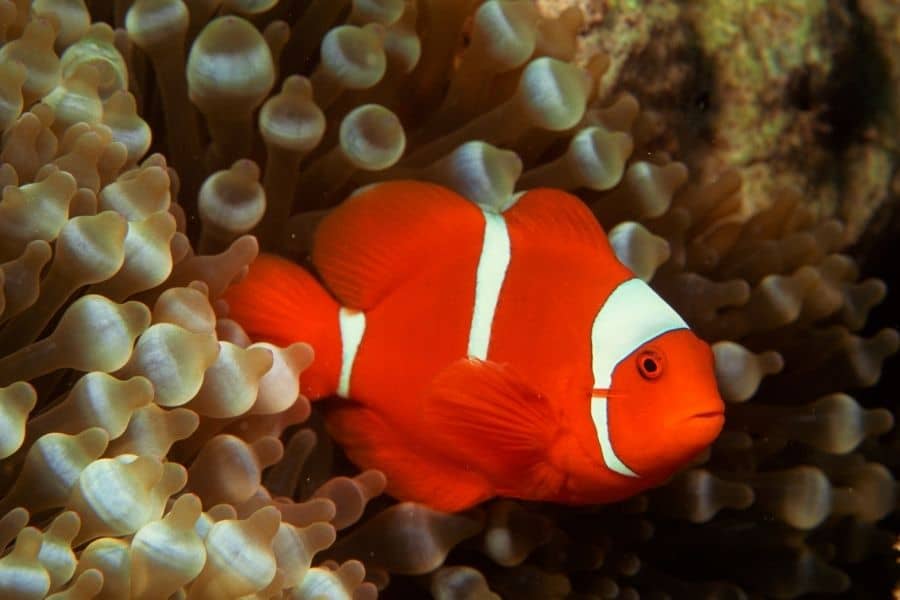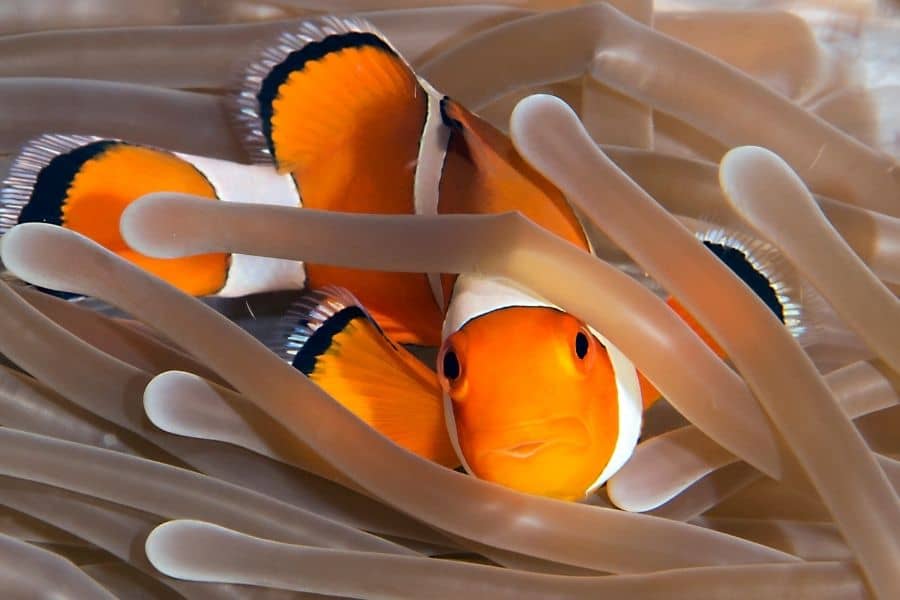In the wild, clownfish live at the bottom of the ocean, where corals are present. They also live in the lagoons. The warm tropical waters are the home of clownfish. Clownfish have a relatively good life span. In the wild, they can live around 6 to 10 years.

How Long Do Clownfish Live In A Tank Or Captivity?
Jump To
In aquariums, clownfish have around 3 to 5 years of life span. But the life span of the fish varies with several factors.
| Clownfish Type | Lifespan | Care level |
|---|---|---|
| Common Clownfish | 3-5 years | Easy |
| Maroon clownfish | 3-7 years | Easy |
| black clownfish | 3-5 years | Easy |
| Cinnamon Clownfish | 17 years or more | Easy |
| Tomato Clownfish | 6-8 years | Easy |
| Clarkii Clownfish | 12-14 years | Easy |
| Pink Skunk Clownfish | 20-21 years | Easy |
| Saddleback Clownfish | 12 years or more | Moderate/ Intermidiate |
| Orange Storm Clownfish | 8-10 years | Easy |
Factors Affecting clown fish life span
- Tank space
- Food
- Water condition
- Salinity
- Water Temperature
Additionally, in the wild, clownfish have a symbiotic relationship with certain sea Anemones. It means both animals have benefits when they live together. Clownfish eat the remaining food from fish that are on a sea anemone. The remaining includes isopods, copepods, and zooplankton. But in a fish tank, they cannot maintain this relationship. Further, the fish tank environment does not perfectly match the same as their natural environment. It causes to reduces the life span of clownfish when you rear them in a fish tank.
The lifespan of aquarium bread clownfish and wild clownfish
Clownfish have a symbiotic relationship with sea anemones in the wild. They link with certain sea anemones to find food. Anemones also have been used from clownfish. The Clownfish can clean algae remains from sea anemones’ bodies. Further, they provide better water circulation to the sea anemone while swimming.
Clownfish’s body is covered with mucus, and it helps them to protect from sea anemones. In a fish tank, Clownfish cannot maintain this symbiotic relationship. Clownfish have to live in a limited space and satisfy with food. Thus, the life span of clownfish in a fish tank is relatively shorter than in wild. Generally, they live around 3 to 5 years in a fish tank. In their natural habitat, clownfish live around 6 to 10 years.
What can reduce the lifespan of clownfish?
In a fish tank, clownfish live the environment that fish hobbyists provide for them. Most of the time, the aquarist cannot provide ideal conditions for clownfish. It reduces the life span of clownfish in a fish tank. The following mentioned reasons highly affect the clownfish’s lifespan.

Water Quality
Water quality is a critical factor that determines the life of any fish. You should provide ideal water quality parameters to keep healthy fish. The water quality parameters are;
The temperature of water: 73- 84 Fahrenheit is ideal. The water temperature should keep stable. If not, it directly affects the fish.
Water pH level: Water pH is a critical thing. Clownfish need slightly alkaline water conditions. The pH should be between 8.1-8.4. If you do not consider the pH level, Clownfish may have a bad influence on it.
The salinity of water: Clownfish prefer to live in saline water which has 1.023 – 1.025 specific gravity. If aquarists are unable to maintain this salinity level, it affects the fish’s osmoregulation process. If the fish lose their ion balance, they will die soon. You should maintain the salinity of the water at a stable level. Water evaporation and water replacement can change the saline level of the tank. When water evaporates, the salinity level will increase. If you add new freshwater to replace the existing water, it will reduce the salinity level of the water. Both processes directly affect the water salinity level and also fish health.
Ammonia, Nitrites, Nitrates: These compounds are highly toxic to every fish, including clownfish. These substances’ concentrations should be at zero. If it exceeds ten ppm, marine organisms will be badly affected. These compounds produce due to fish hobbyists’ bad practices. These are;
Overfeeding
Excess food contains high protein levels. Deterioration of fish food generates ammonia, nitrate, and nitrites.
Lack Of Water Changes: Some aquarists do not exchange tank water for months. Then fish fecal matter can accumulate in the tank, and those compounds can spoil and deteriorate the water.
Water Filtration System: The filter system should be enough to filter the water in the tank. If you install the wrong filter or the filter is not functioning well, fish fecal matter, and excess food can accumulate in the tank. That debris can produce nitrogenous waste, which is highly toxic to the clownfish.
Overcrowded Tank: Overcrowded tank generates more waste within a short time. Further, fish may fight with tank mates for territory. Additionally, the oxygen supply will not be enough for fish. These facts can cause to reduce the life span of your clownfish.
Non-Compatible Tank Mates
The clownfish is a peaceful creature. But if you add clownfish with a different variety of the same genus, they will show aggressive behaviors. The Tomato clown, Maroon clown, or any other clownfish are unable to live together. If you mixed those varieties, all the clownfish might stress. Then their life span will reduce. To reduce the aggressive behaviors of clownfish, add six, or seven fish together.
Diet
Clownfish are hardy eaters. In the natural environment, they have a symbiotic relationship with sea anemones. Because of their omnivorous behavior, they can rely on any food type. But in captivity, if they cannot have enough food or quality foods, it causes to reduce their life span.
Size Of The Tank
Clownfish can live in 10 gallons tanks. But if you try to put them in a tiny tank or fish ball, they will die due to the stress. Further, the salinity and ammonia level may suddenly fluctuate in the small tanks. Clownfish are very sensitive to these parameters. Thus, if they fluctuate regularly, clownfish may have a harmful impact.
Clownfish Disease
It is a common parasite found in marine fish. The scientific name of the parasite is Brooklynella hostilis, and they attack the gills of the fish. If you do not give proper treatments immediately, clownfish may die within a few hours or days.
Major symptoms
- Breathing difficulties
- Fish become lethargic
- Refuse to eat
- Fade the body colors
- Thick whitish mucus covers the body
Treatment
A dip bath in freshwater gives temporary relief to fish. If not, you can kill the parasite using the following methods.
- Chloroquine treatment for 14 days, the dose is 15 mg/l
- Daily dip infected fish in a formalin solution for 15 minutes. The formalin concentration should be 150 ppm.
Maintain water salinity of quarantine tank at 1.018 specific gravity. It assists the clownfish in balancing the electrolytes lost due to skin and gill damage. This disease is also common in saltwater Jawfish, Angelfish, Wrasses, and seahorses.
Are Clownfish Suitable For Beginners?
Yes, generally, Clownfish is a hardy fish. Further, their space requirement is relatively low than other fish. Thus, I can recommend clownfish to rear for the beginner. As a beginner, you should gain good knowledge before adding them to your aquarium. You must have good background knowledge about clownfish,
- Foods
- Water quality requirement
- Minimum space requirement
- Suitable tankmates
If you can reach the above factors properly, Clownfish will live a long time with you.
Related Questions
Can Clownfish Live In A Pond?
Yes, Clownfish can live in a saltwater pond if the following parameters ideally match their preferred level.
- Salinity: 1.023 -1.025 specific gravity
- Temperature :
- pH: 8.1-8.4
- Ammonia, Nitrates, Nitrite level : 0 ppm
In the pond, they can live freely more than in a small tank or aquarium. But you should provide enough food for clownfish. Further, it would be best if you took precautions to protect them from predators, such as snakes, birds, and domestic animals. You cannot rear clownfish in a freshwater pond because water salinity is a significant factor that helps clownfish regulate their osmosis pressure. Aquarists rear sea anemones in their saltwater ponds. If you can establish them in your pond, it gives a natural feel to your clownfish.
How Long Can Clownfish Live In Freshwater?
The marine fish and freshwater fish’s biology are different. Marine water fish cannot do their osmoregulation process in freshwater. Additionally, freshwater fish cannot maintain osmotic balance in saltwater. Hence, clownfish cannot spend in freshwater for a long time. If you allow them to live one-two hour in freshwater, they will immediately die. They cannot survive an extended period in freshwater.
Conclusion
Clownfish or “Nimo” is a fantastic creature that adds extra value to your saltwater tank. They consider hardy fish. Thus, Clownfish is recommended for beginners. But if you do not maintain water quality parameters at an optimum level, the clown fish’s life span will reduce.
Related : How Big Do Clownfish Get? Size Comparison on Each Species.
Related : Can Clownfish Change Gender? Interesting Facts You Must Know
Must See : How Much Do Clownfish Cost By Type? Must-Know Things
